Need to recover your data but not sure who to trust? You’re in the right place. We’ve done the hard part for you. We analyzed the market, compared service features, turnaround times, pricing models, real recovery results, and narrowed it down to the five best data recovery companies worth relying on in 2025.
You’ll also find out when it makes sense to call in the pros, and when recovery software might be enough to get the job done on your own. Let’s break it all down.
When Professional Recovery Service Is the Smartest Move
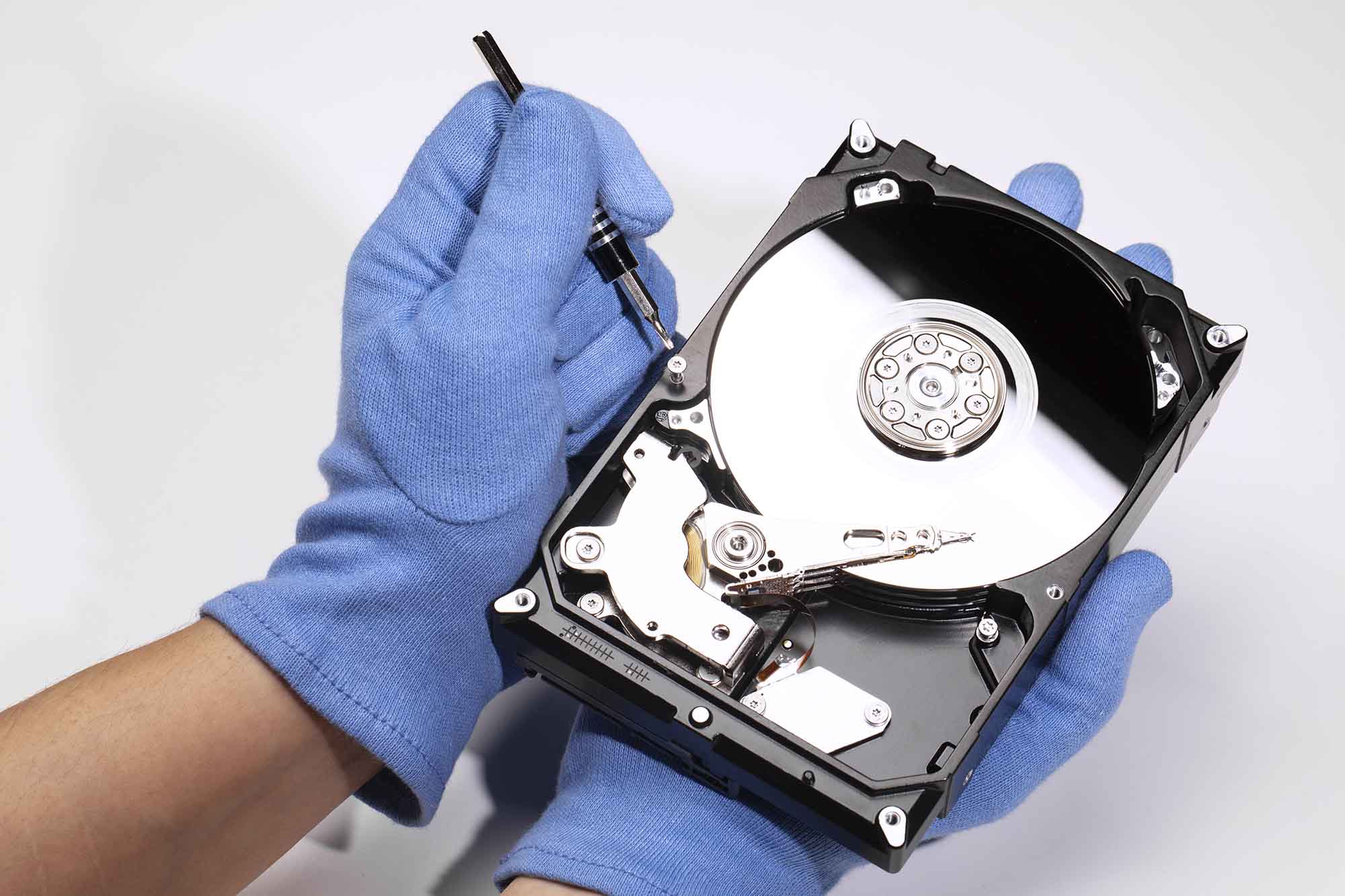
Let’s get something straight: data loss doesn’t always mean disaster. Sometimes it’s a quick fix. Deleted files, an accidental format, a glitchy USB stick? Data recovery software can absolutely handle those. But when things get serious – when there’s clicking noise or a dead drive – that’s when you need to back away slowly and let the professional step in.
That said, it’s not always easy to tell where that line is. So to help you figure out what route to choose, here’s a quick table that might save you time. If your situation lines up with the left side, hard drive recovery software might be enough. If it sounds more like the right… close that laptop and call professionals.
| DIY Recovery Software | Professional Service |
|
|
📌 So here’s the bottom line: DIY recovery software is best when the problem is logical, not physical. As soon as hardware gets involved (or if the lost data is irreplaceable), the smartest move is to stop everything and call a pro. Because once a drive fails completely, there are no do-overs.
5 Best Hard Drive Data Recovery Services in 2025
Here are five of the best HDD recovery services currently available to assist you with your data loss issues. Let’s take a closer look at how each one stacks up.
1. SALVAGEDATA Data Recovery Service
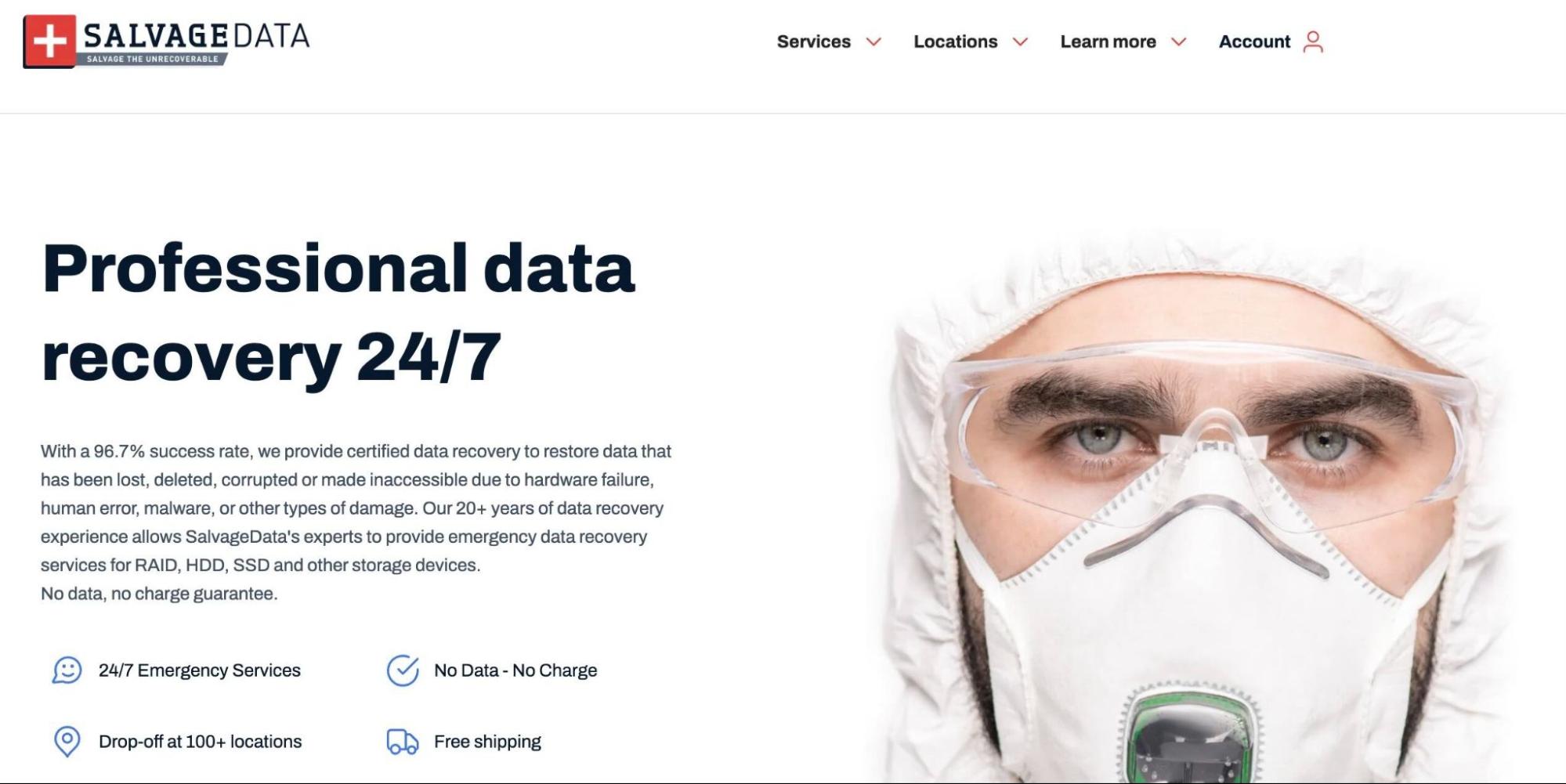
| Criteria | Details |
| Device Coverage | HDD, SSD, RAID (0-10), NAS, SAN, flash drives, SD cards, encrypted drives |
| Success Transparency | ✔️ “No data, no charge” policy |
| Pricing Clarity | Free evaluation + fixed quote; no hidden fees; return shipping included |
| Turnaround Options | Standard (5-7 days), Economy (10-15 days), Emergency (24/7/365) |
| Customer Access | 24/7 hotline, live chat, email support |
| Geographic Reach | 100+ drop-off locations across U.S. and Canada |
| Cleanroom Grade | ISO-5 / Class 100 certified |
| User Feedback | Excellent Trustpilot score (4.6), positive reviews for support & results |
📝 Summary: SALVAGEDATA is one of the more established players in the recovery industry, with over 20 years behind them and a long client list that includes government agencies and healthcare providers. What sets them apart isn’t flash – it’s infrastructure. They operate a fully certified ISO-5 cleanroom, use proprietary recovery tools, and offer a strong range of services covering everything from failed HDDs/SSDs for PC or Mac to multi-disk RAID arrays and encrypted drives.
Their pricing structure is straightforward. You get a free evaluation, a flat-rate quote, and a clear “no data, no fee” policy that actually holds up in practice. Turnaround times are tiered depending on urgency, and their emergency service is one of the few that’s actually 24/7. We also liked that they include shipping both ways – no nickel-and-diming for logistics.
Customer support is responsive, with 24/7 availability and an online case portal to track progress. Overall, SALVAGEDATA feels like a safe, professional choice if you’re dealing with serious data loss, especially if you need lab-level recovery without second-guessing the process or price. Yes, it’s not the cheapest professional data recovery service on our list, but you’re paying for consistency, transparency, and real technical capability.
2. ACE Data Recovery Service
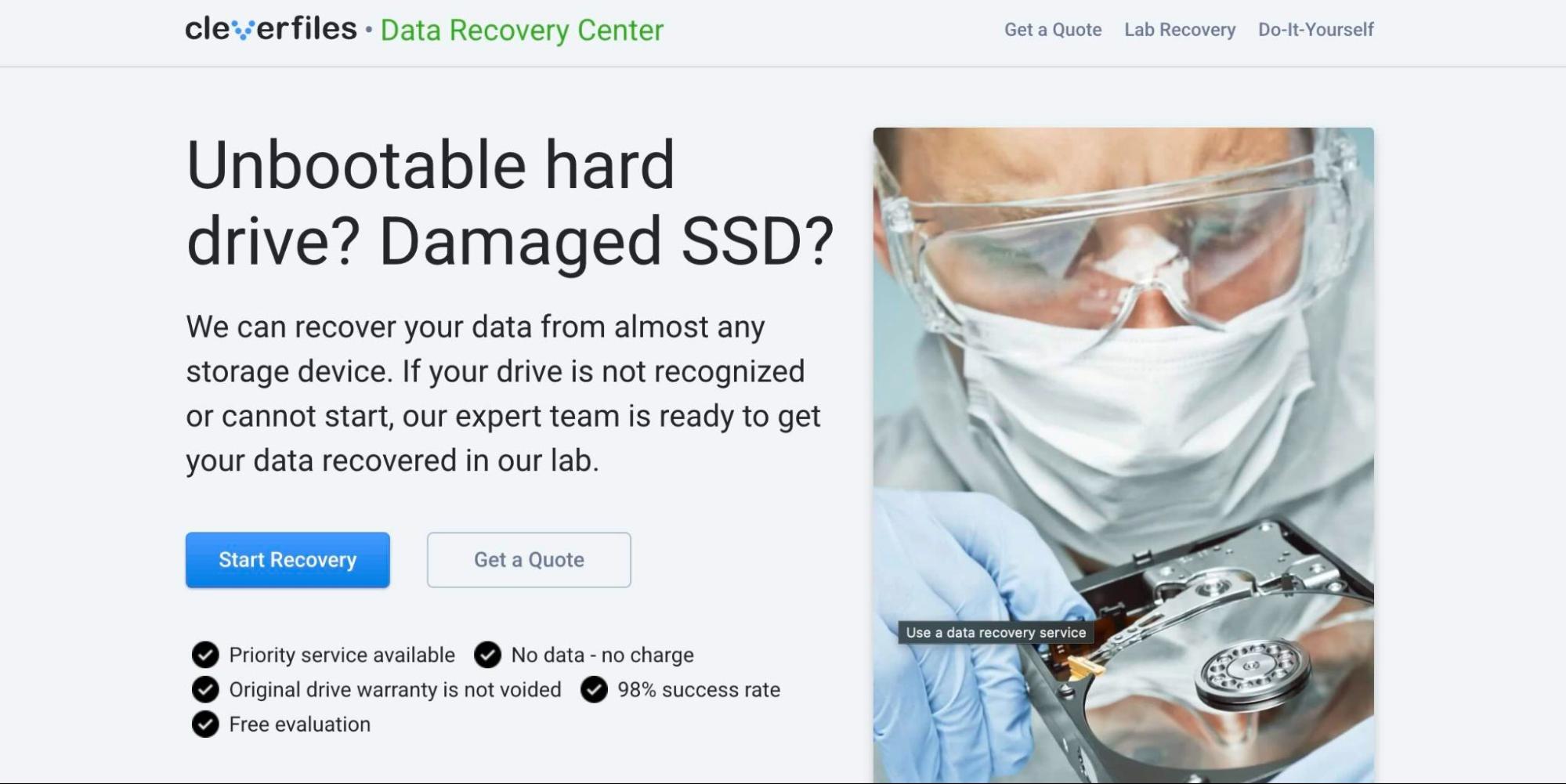
| Criteria | Details |
| Device Coverage | HDDs, SSDs, RAID (all levels), tapes, USBs, memory cards, databases |
| Success Transparency | ✔️ “No data, no charge” policy |
| Pricing Clarity | Free diagnostic + fixed quote; no hidden or per-GB fees |
| Turnaround Options | Standard (3-7 days), Expedited (1-2 days), Emergency (24/7) |
| Customer Access | Toll-free line, real-time status portal |
| Geographic Reach | Multiple U.S. service centers; lab based in Dallas |
| Cleanroom Grade | Class 100 (ISO-certified) cleanroom |
| User Feedback | Good Trustpilot score (4.5), solid reputation; often recommended by major manufacturers |
📝 Summary: ACE Data Recovery has been around longer than most, over 40 years, in fact. They’ve earned referrals from names like Dell, Intel, and Western Digital, which is a good sign they know what they’re doing, especially in complex cases. Their range is wide: from standard HDD and SSD recovery to more specialized stuff like legacy tape formats and Exchange or SQL Server databases.
What makes ACE unique is its in-house tech. They actually build some of their own recovery tools, including a proprietary system that lets them work on clones of failed drives instead of risking the original media. That’s a level of control most services don’t offer, and it gives them an edge when dealing with delicate firmware issues or drives with physical damage.
Their pricing structure is also one of the more transparent we’ve seen. Free diagnostic, fixed quote, no surprise add-ons (except a small fee if the device has been tampered with). They offer flexible turnaround times depending on urgency, and while they’re not the fastest by default, they can be if you need it.
Bottom line? ACE is a highly competent, enterprise-grade recovery service with a long track record and the engineering chops to back it up. Their tools aren’t just off-the-shelf, and their experience handling complex cases shows. That’s why they landed in our top 5, and why many consider them the best hard drive recovery service in the business.
3. DATATECH Labs
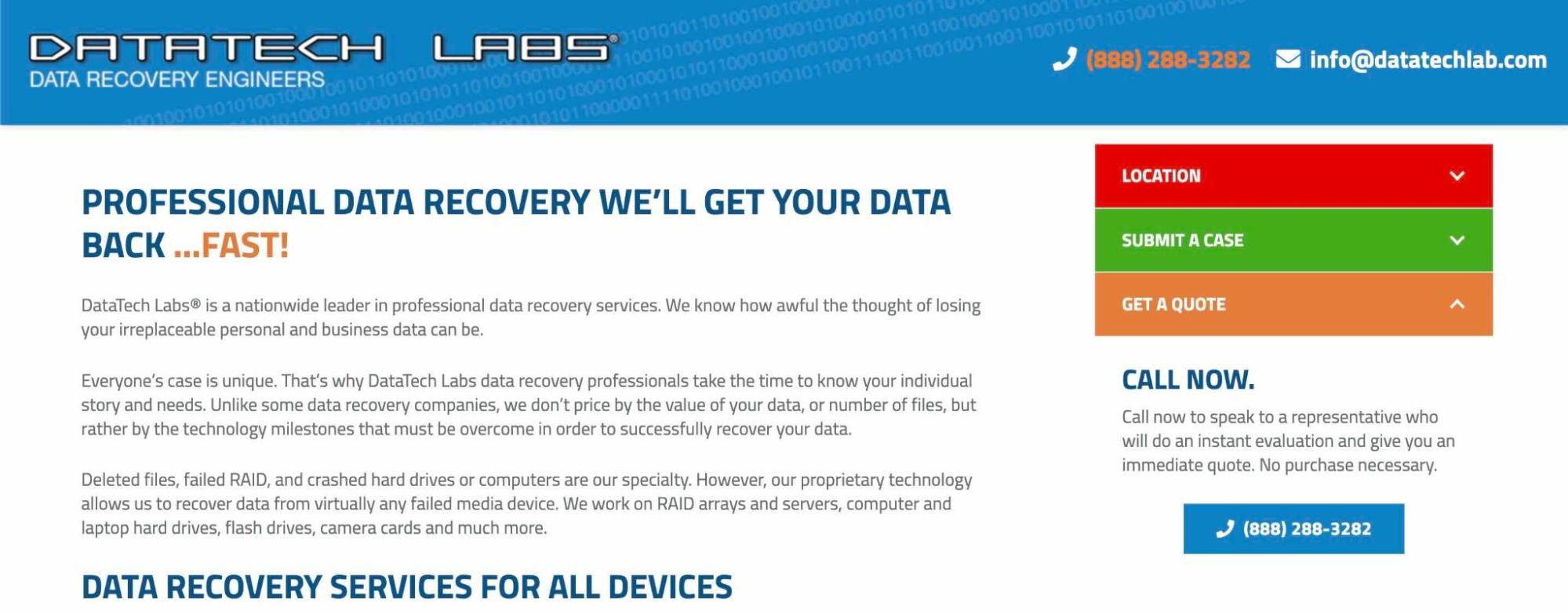
| Criteria | Details |
| Device Coverage | HDDs, SSDs, RAID, USB, SD cards, DVRs, tapes, virtual machines |
| Success Transparency | ✔️ “No data, no fee” policy |
| Pricing Clarity | Free evaluation + flat-rate quote; pricing based on recovery complexity |
| Turnaround Options | Standard (2-3 days), Expedited (<48 hrs), Emergency (24/7 available) |
| Customer Access | Dedicated case manager, phone, email |
| Geographic Reach | 2 full-service labs, 45+ drop-off centers in the U.S. |
| Cleanroom Grade | ISO-5 / Class 100 certified |
| User Feedback | Strong Trustpilot score (4.7); praised for speed, clarity, and professional communication |
📝 Summary: DATATECH Labs doesn’t have the longest track record on this list, but they’ve built a solid reputation for their speed, transparency, and flexibility. Founded in 2006, the company covers everything from standard consumer drives and SSDs to enterprise RAID arrays, virtual machines, and even legacy storage formats like tape. They’re also one of the few services that actively promote “chip-off” recoveries for flash memory and mobile storage, which gives them an edge for tricky cases.
What stood out in our research is how clearly they explain their pricing. Instead of charging per gigabyte or per file, they quote based on the technical complexity of the job, something that keeps costs more predictable. Evaluations are free, and they’ll only proceed once you’ve reviewed and approved a flat-rate quote. If they can’t recover the data, you don’t pay.
Turnaround times are fast. Many standard cases wrap up in just 2-3 days, and expedited or emergency services can cut that even further. Their communication style is also a plus – a customer gets a case manager, and the support team tends to keep things straightforward. Overall, if you’re searching for the best data recovery service that balances performance with accessibility, DATATECH Labs is a strong contender.
4. Gillware Data Recovery Service
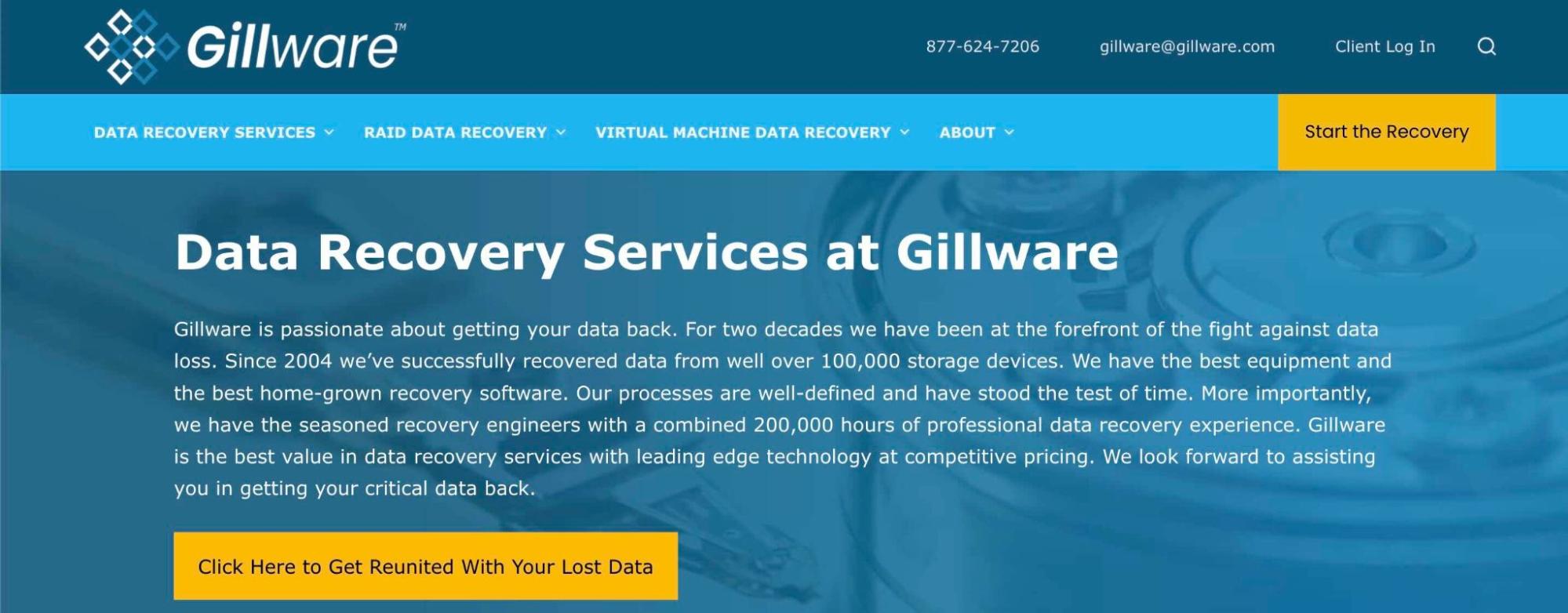
| Criteria | Details |
| Device Coverage | HDDs, SSDs, RAID (1-60), USBs, SD cards, servers, VM disks, forensic cases |
| Success Transparency | ✔️ “No data, no charge” policy |
| Pricing Clarity | Free evaluation; flat quote; no hidden fees; return shipping included |
| Turnaround Options | Standard (1-3 days), Emergency (24 hrs) |
| Customer Access | Email, phone support, evaluation updates via portal |
| Geographic Reach | Based in Wisconsin; nationwide via shipping |
| Cleanroom Grade | ISO-5 / Class 100 (clean benches with HEPA filters) |
| User Feedback | Decent Yelp reviews (3.9 average) highlight their fair pricing and quick turnaround |
📝 Summary: Gillware stands out for doing things a little differently, and in a good way. They were early to ditch the old-school pricing model of upfront fees and vague estimates, and instead leaned into a risk-free structure: free evaluations, no payment unless they actually recover something. That alone earned them a strong following, especially among individuals and small businesses dealing with data loss.
From a technical standpoint, they’re more than solid. The 14,000 sq. ft. lab’s cleanroom setup is unconventional; they use multiple Class 100 clean benches instead of one large cleanroom, but it meets the same ISO-5 standards and keeps overhead (and costs) lower. Their in-house tools, including custom forensic imaging software and a unique platter polishing system, show real investment in solving tough cases.
Turnaround times are a strong point too. While many others quote 5-7 days, Gillware often wraps up standard recoveries in two or three, with emergency services available for 24-hour recoveries. We also liked how they handle customer communication: straightforward updates, detailed recovery reports, and no sales pressure.
All in all, Gillware isn’t trying to be flashy. They’re focused on being fast, affordable, and practical. They might not be the best hard drive data recovery service out there, but they’re definitely near the top.
5. SERT Data Recovery
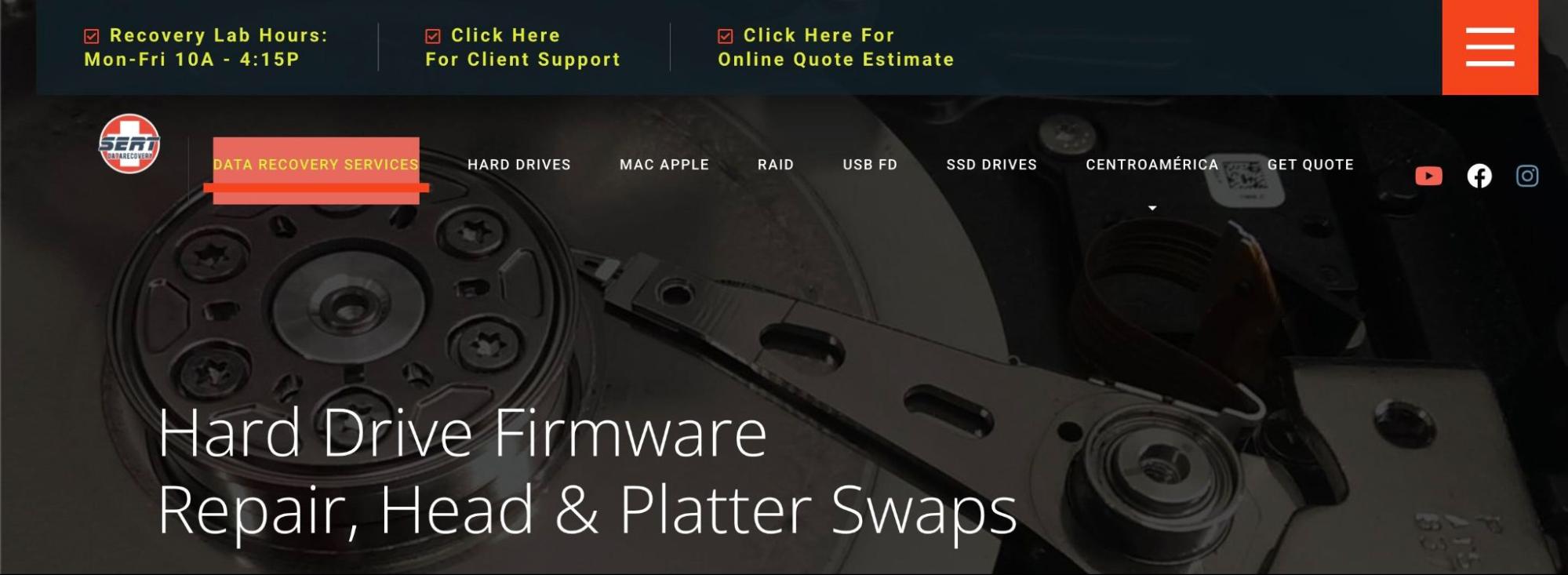
| Criteria | Details |
| Device Coverage | HDDs, SSDs, RAID (up to 36 drives), USB/SD, smartphones, encrypted media |
| Success Transparency | ✔️ “No data, no charge” policy (minus upfront eval fee) |
| Pricing Clarity | Flat-rate quotes based on failure type; no per-GB pricing |
| Turnaround Options | Evaluation in 24 hrs; standard or emergency options available |
| Customer Access | 24/7 support line, extended lab hours, email/phone contact |
| Geographic Reach | Based in Florida, but serves nationwide via free shipping |
| Cleanroom Grade | ISO 5 / Class 100 cleanroom-certified |
| User Feedback | 4.3 average on Yelp; praised for transparency and technical depth |
📝 Summary: SERT Data Recovery might not have the name recognition of some of the larger labs, but it consistently punches above its weight. The team specializes in tough jobs: damaged SSDs, chip-off recoveries, encrypted flash storage, even ransomware-damaged drives. And unlike many competitors, they don’t shy away from working with unusual or deeply technical failures.
They rely on proven tools like PC-3000 and DeepSpar, rather than building everything in-house, but that’s not necessarily a drawback here. Their imaging-first process and strict cleanroom protocols show that the fundamentals are in place. Their engineers follow a methodical workflow, process follows best practices: first, they clone the drive, then they work on the copy.
Pricing is generally reasonable and clearly laid out, though, unlike most competitors on this list, SERT does charge a small evaluation fee up front. In most cases, that amount is credited toward the final cost if you move forward. With a reported 94% success rate and a technically sound recovery process, the fee feels justified, but it’s something to be aware of going in. Their communication is usually solid, though a few reviewers mentioned delays on complex jobs.
In short, SERT is a smart pick if you’re looking for one of the best professional data recovery options tailored to individuals and small businesses, especially if you’re dealing with a failed SSD or flash device and need one of the best SSD data recovery service providers in the country.
Honorable Mentions
These were our top picks, but we felt our data recovery service review wouldn’t be complete without mentioning a few other standout providers. While they didn’t make the main list for one reason or another (pricing, availability, or specialization), they’re still solid options, especially if you’re searching for a data recovery lab near me or need more localized support.
Data Mechanix
| Category | Details |
| Services Offered | HDDs, SSDs, RAID, NAS, USB/flash, mobile, legacy systems |
| Cleanroom Standard | ISO Class 100 certified cleanroom |
| Turnaround Options | Standard (1-5 days), Expedited (24 hrs), Emergency 24/7 + onsite service |
| Evaluation Policy | Free evaluation (upfront pricing after diagnosis); some after-hours fees |
| Notable Strengths | Onsite recovery, proprietary utilities, 28+ years in operation |
| Location | Based in Irvine, CA; serves clients nationwide |
📝 Summary: With over 28 years of experience, Data Mechanix delivers full-service recovery for everything from failed SSDs to massive enterprise RAID systems. They offer flexible service tiers (including onsite emergency recovery) and maintain an ISO-certified cleanroom backed by in-house tools and diagnostics. While their pricing varies depending on complexity, the initial evaluation is free and thorough. It’s a strong, well-rounded option for professional data recovery.
Ontrack Data Recovery
| Category | Details |
| Services Offered | HDDs, SSDs, RAID, mobile, tape, flash, virtual systems, ransomware recovery |
| Cleanroom Standard | Global ISO-certified facilities |
| Turnaround Options | Standard (7-14 days), Priority (2-5 days), Emergency (24/7) |
| Evaluation Policy | Free evaluations with file list before payment |
| Notable Strengths | Global reach, in-lab + remote + onsite options, enterprise-level expertise |
| Location | Multiple U.S. labs; global engineering support |
📝 Summary: Ontrack is one of the best data recovery companies in terms of global scale and long-term experience. With over 35 years in the field and millions of recoveries, they’ve built an infrastructure that can handle anything: from failed hard drives to corporate ransomware attacks. While pricing may lean premium, their free evaluation, secure customer portal, and variety of service levels (including remote and onsite) make them a flexible, trusted choice for both individual and enterprise clients.
Secure Data Recovery
| Category | Details |
| Services Offered | HDDs, SSDs, RAID, mobile devices, tape, encrypted drives, ransomware cases |
| Cleanroom Standard | Class 10 ISO 4 cleanroom (stricter than typical Class 100 ISO 5) |
| Turnaround Options | Standard (few days), Emergency 24/7, On-site recovery |
| Evaluation Policy | Free diagnostics and quote, “No Data, No Recovery Fee” guarantee |
| Notable Strengths | Over 100K cases, global lab presence, highest industry certifications |
| Location | 200+ locations across North America and the UK |
📝 Summary: Secure Data Recovery brings enterprise-grade recovery capabilities to the general public, and their 96% success rate backs that up. With one of the strictest cleanroom standards in the industry and a massive footprint across North America, they’re equipped to tackle nearly any data loss, whether from a fried SSD or a 20-disk RAID failure. Their evaluation is free, pricing is competitive, and the “no recovery, no fee” policy makes them low-risk to try.
How We Evaluated the Best Data Recovery Services
Just like with any other service, not all data recovery companies are equally good, and when it comes to your files, there’s no room for guesswork or second chances. You’re not ordering takeout here.
To make sure our top picks were actually worth your trust (and your money), we focused on real-world performance, customer experience, and the kind of transparency you’d expect from someone handling your most important files. Here’s what we looked at – and why it matters.
- 📱 Device coverage. A solid recovery service should be able to handle anything you throw at them: HDDs, SSDs, flash drives, memory cards, smartphones, RAID arrays (all levels), and even older stuff like tapes or DVR hard drives. We prioritized services that support both consumer and enterprise-level gear.
- 🧾 Success transparency. We made sure every service on this list has a “no data, no fee” policy. That means if they can’t recover your files, you don’t pay – period. It’s a simple promise, but you’d be surprised how many companies dodge it or only honor it under specific conditions.
- 💵 Pricing clarity. Recovery isn’t cheap, but it shouldn’t be a mystery either. We looked for services that offer free evaluations and flat-rate quotes – no per-gigabyte tricks or vague hourly estimates. Bonus points if they cap their parts/lab fees in writing so your final cost doesn’t spiral out of control halfway through.
- ⏱️ Turnaround options. Some recoveries can wait. Others? Not a chance. That’s why we favored providers with tiered options – standard service for typical cases, expedited for faster results, and 24/7 emergency recovery for the “I need this yesterday” situations.
- 📞 Customer access. This isn’t a buy-it-and-forget-it transaction. We expect clear, timely updates. All of our picks offer strong customer support, including a 24/7 hotline, live chat, or toll-free number. Some even assign dedicated case managers for ongoing updates.
- 📍 Geographic reach. It’s not just about having a lab – it’s about how close that lab is to you. We considered both the number of full-service recovery labs and drop-off locations. SALVAGEDATA, for example, has over 100 drop-off spots across North America, which makes the process way less stressful.
- 🔬 Cleanroom grade. Opening a hard drive outside of a certified cleanroom can kill it. We required an ISO-certified Class 100 cleanroom (or equivalent) for any provider that handles physical damage recoveries. Anything less, and your chances drop.
- 💬 User feedback. We didn’t rely on marketing promises, we read reviews. Lots of them. From Trustpilot and Yelp to tech forums and Reddit threads, we checked what real customers had to say. We paid close attention to stories about both successes and screwups.If a company was slow to communicate, vague with pricing, or couldn’t follow through, we took note. If they recovered a client’s data after another service failed? We noted that too.
How to Choose the Right Data Recovery Service
We realize that choosing the right data recovery service isn’t something most people plan for, until their drive crashes or an important work file disappears. And when that happens, it’s easy to feel a bit lost.
That’s why we decided to include this step-by-step guide in our review: to help you know what to look for, what questions to ask, and how to steer clear of common traps. Consider it your roadmap.
Confirm the Problem
First step. Before you reach out to any recovery service, take a moment to assess what’s actually happening. Is the drive clicking when it powers up? Does it show “0 B” capacity? Was there accidental deletion, a sudden power outage, or obvious physical damage?

Jot down the symptoms and anything that happened before the failure. This helps in two ways:
- First, it lets you figure out if you might fix the issue yourself using data recovery software.
- Second, it gives the recovery engineers a head start. The more detail you provide, the more accurate their diagnosis, recovery plan, and quote will be.
Determine What Needs to Be Restored
Take a few minutes to list out what you’re hoping to get back. Is it a client folder, a batch of RAW photo files, a financial database, all of the above?
Try to estimate how much data you’re missing – 1 GB? 2 TB? The more specific you are, the better. This helps the recovery lab focus their efforts and gives them a much clearer idea of the scope. It also affects your quote: recovering a few key folders is often faster (and cheaper) than pulling everything off the drive, especially if time is a factor.
Collect Basic Service Facts

Before you send your device anywhere, do a little digging. Read through the info we’ve laid out in this guide, then go a step further: check the service’s website, look for customer reviews (especially from people with similar issues), and see what kinds of devices and failures they actually handle. Do they mention SSDs? Complex RAID setups? Firmware repair?
This step matters more than people realize. It can save you from wasting time and money on a service that simply isn’t equipped for your situation. The goal is to match your problem with a provider that clearly knows how to fix it.
Request the Free Evaluation
Once you’ve narrowed down your list, it’s time to reach out.
Any respectable data recovery service offers a free evaluation. And if they don’t, that’s a red flag. Submitting your drive for an initial assessment helps you confirm whether recovery is even possible, without spending your money. Most top-tier labs also follow a “No Data, No Charge” policy, which means you only pay if they actually get your files back.
This step will not only filter out questionable services but also clarify the likelihood of success, estimated costs, and next steps – all with no obligation.
Ask Direct Questions

Data recovery isn’t always a straightforward process – there are a lot of variables at play, from the type of failure to the device’s condition. That’s why you shouldn’t be shy about asking tough questions upfront.
- How much will it cost, start to finish?
- How long will it take?
- Have they handled a case like yours before?
- What’s the actual chance of success?
A reputable service won’t dance around these questions – they’ll answer them clearly and honestly. Getting these details ahead of time can save you from misunderstandings, unexpected fees, or unrealistic expectations down the line.
When it comes to your data, clarity is everything.
Approve and Wait
Once you’ve gone through all the steps, asked your questions, and sent in your device, it’s time to let the pros do their work. If everything looks good and you approve the quote, the recovery process begins. From here, it’s a bit of a waiting game.
Turnaround times vary depending on the provider and the severity of the failure. As we noted in each review, most services offer speed tiers: Standard (typically 3-5 business days), Expedited (1-2 days), and Emergency (24/7 around-the-clock). But if your case involves something particularly tricky, expect it to take longer. That’s normal.
The important thing is to be patient and stay in touch. A good recovery service will keep you updated through a case portal or direct communication.
At this point, you’ve done your part, now it’s their turn to get your data back.
Closing Thoughts
By now, it should be clear, data recovery isn’t one-size-fits-all. Some situations are relatively simple. If the drive is still healthy and the loss was recent, you might be able to recover the data yourself with good software and a bit of care.
But other cases? They’re not so forgiving. Severe hardware damage, failed RAID arrays, or encrypted drives demand the precision and tools only a professional lab can provide. And when the data really matters, risking it with the wrong approach could mean losing it for good.
Every service we reviewed here has the expertise to help. Now it’s up to you to decide who fits your situation best – whether that’s based on turnaround time, pricing, or how easy they make the process. Pick the one that’s most convenient or offers the best deal, and let them do what they do best: give your data a second chance.



